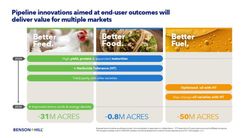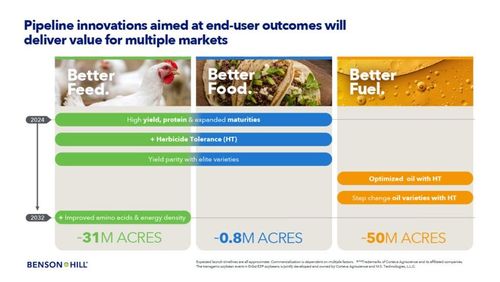Benson Hill expands innovation pipeline with advantaged traits for animal feed, soybean oil and biofuels segments



SOURCE: Benson Hill
July 18, 2024
BY Benson Hill Inc.
Benson Hill Inc., a seed innovation company, on July 16 shared further advancements in its innovation pipeline to deliver advantaged traits for end users in larger soy markets, including animal feed, soybean oil, and biofuels. These innovations, many of which are in field testing now, uniquely position Benson Hill to redefine U.S. soy for feed and fuel with new varieties that provide novel benefits across the agribusiness value chain.
“No other seed company is focused on soy quality traits for specific end markets,” said Deanie Elsner, CEO of Benson Hill. “With the depth of our soybean data, our proprietary soy germplasm, and the millions of data points we analyze, we believe we can solve problems for the soy end user with unmatched precision and speed. Whether we are creating more nutritious soybean meal or delivering improved oil, Benson Hill is poised to elevate the standard for U.S. soy over the next decade.”
The company’s focus on optimizing yield, protein, and oil in the soybean genome addresses the disconnect between current soy composition and its intended uses. For example, ‘dual value beans,’ soybean varieties that can simultaneously deliver improved soybean meal with either better quality oil for consumption or improved oil for the emerging biofuels market, are advancing rapidly in Benson Hill’s pipeline alongside product candidates that push the limits of protein and yield.
Advertisement
“The rate at which we’ve increased yield, boosted protein, and expanded maturity zones since 2019 is far beyond what I have seen in the industry and is a direct result of our technology and focus,” said Jason Bull, chief technology officer of Benson Hill. “Our upcoming innovations are designed to hit purpose-driven outcomes such as better digestibility, higher feed energy density, and improved oils. We believe these technology advances will create significant value downstream.”
To fully unlock that value, Bull outlined three focus areas for Benson Hill’s pipeline through 2032:
- Enhance varieties for near-term impact in animal feed (projected launches in 2024-2027): By increasing the yield potential and expanding geographic maturities for its proprietary genetics grown across the U.S., Benson Hill can deliver better soybeans for feed applications such as poultry by increasing the protein and metabolizable energy. Benson Hill recently validated the benefits of its proprietary soybean meal with industry leader Perdue Farms. Bull expects the expanded maturities in the Company’s innovation pipeline to allow more soybean farmers and seed partners to utilize its proprietary portfolio.
As shared in its Q1 earnings update, the Company will continue to pursue broadacre expansion in feed and fuel and expects to broaden its soybean portfolio to approximately 35 varieties by 2025. Non-GMO, Ultra-High Protein Low-Oligosaccharide (UHP-LO) soybean varieties, destined for animal feed, are expected to yield on par with elite GMO commercial varieties by 2026-27, with herbicide-tolerant varieties now slated for 2026, a year earlier than previously communicated. Incorporating herbicide tolerance will provide easier weed control and enable large-acre adoption of Benson Hill UHP-LO varieties in the coming years. - Improve oil for biofuels and crude oil soy markets (projected launches in 2028-2030): Benson Hill is also gearing up to introduce a range of soybean varieties for biofuels and crude oil applications by the end of the decade. Using years of field testing and genomic data, researchers recently identified promising variety candidates in the pipeline that could serve a total addressable domestic market of approximately 50 million U.S. soybean acres. This initiative underscores the Company’s commitment to sustainability and highlights how soybeans can play a role in advancing renewable energy solutions.
- Further expand value creation for animal feed with new soy quality traits (projected launches in 2032 and beyond): Looking further ahead, Benson Hill is aiming to expand value creation in animal feed with high-yielding soybean varieties that will feature higher energy density, better protein quality, improved oil, and reduced anti-nutritional factors, which can deliver significant downstream benefits for the animal feed industry.
The strategic advantage for Benson Hill’s soybean seed advancements lies in its proprietary genetics, CropOS® and the Crop Accelerator. Today the Company offers 22 commercial soybean varieties leveraging world-leading germplasm it acquired in 2019. CropOS, its AI-driven technology platform, unlocks the discovery of new traits with a dynamic data lake of agronomic and genetic information. Since 2021, more than 24,000 candidate soybean varieties have been designed and advanced through CropOS, using billions of data points that inform a predictive breeding success rate that rivals top competitors. Benson Hill’s Crop Accelerator, a state-of-the-art rapid prototyping facility, has enabled plant breeders to complete more than 200 crop cycles since the facility opened in 2021. These differentiated core technologies, along with CRISPR gene editing approaches have led to more than 150 gene edits to date, equip Benson Hill to make gains in protein, oil, and end-use traits and stay at the forefront of soy seed innovation.
Advertisement
Scientific advisors, who regularly review the advancement and application of these technologies, have validated Benson Hill’s competitive edge.
“What Benson Hill has accomplished by combining state-of-the-art computational prediction, best-in-class molecular marker technology, and the Crop Accelerator technology, and making this the center of how they do plant breeding, has allowed them to make genetic gains on complex traits at rates unachievable only a few years ago,” said Jon Lightner, former chief scientific officer for Genus PLC and a founding member of the Benson Hill Scientific Advisory Board (SAB). “It is genuinely revolutionary.”
Gary Fogel, SAB member and CEO of Natural Selection Inc., agreed, “Benson Hill continues to impress using artificial intelligence and machine learning for predictive modeling in plant breeding. These approaches offer rapid computational screening of hundreds of thousands of possible plant development paths, leading to biological insights, and maximized market opportunity. Novel predicted outcomes are evaluated at an incredibly fast pace prior to going to the field. This overarching innovation pipeline revolutionizes trait discovery in plants as part of an unparalleled, holistic go-to-market strategy.”
Related Stories
The USDA maintained its forecast for 2024-’25 soybean oil use in biofuel production in its latest World Agricultural Supply and Demand Estimates report, released Feb. 11. The outlook for soybean oil prices was also unchanged.
Sasol, Anglo American and De Beers entered into a joint development agreement on Feb. 4 to pilot the production of feedstock for renewable diesel. The initiative aims to support the development of a value chain for renewable fuels in South Africa.
Verity and Landus announce agreement to track and verify sustainable agriculture attributes at soybean facility
Verity Holdings LLC, a subsidiary of Gevo Inc., and Landus have announced a new agreement aimed at unlocking added value for farmers through sustainability premiums via export markets.
U.S. operatable biofuel production capacity was unchanged in November 2024, according to data released by the U.S. EIA on Jan. 31. Feedstock consumption was up from both the previous month and November 2023.
The U.S. Department of Energy Bioenergy Technologies Office released the Feedstock-Conversion Interface Consortium Capstone Report. The report summarizes the FCIC’s goals, research activities, and achievements over the past three years.
Upcoming Events










